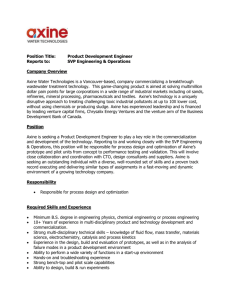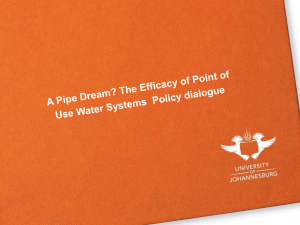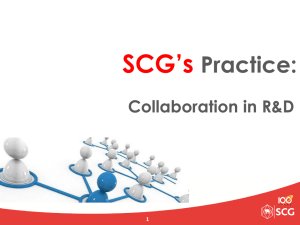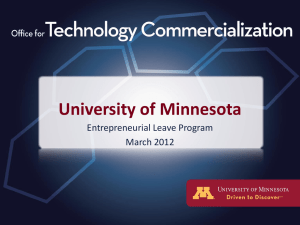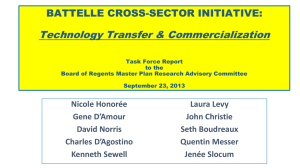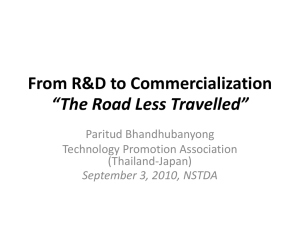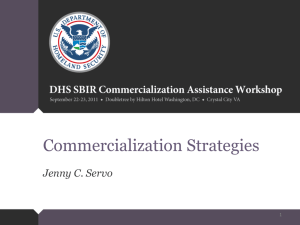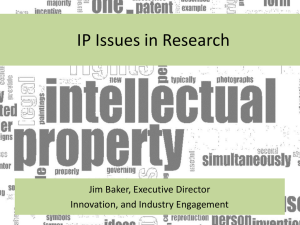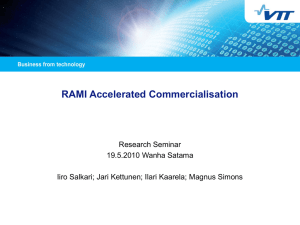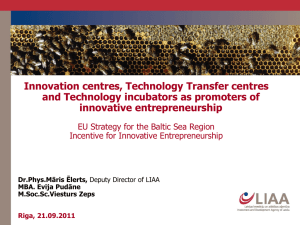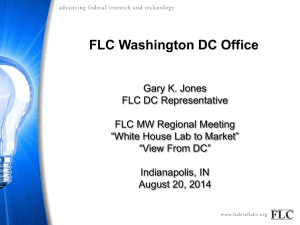Innovation Commercialization Requires
advertisement
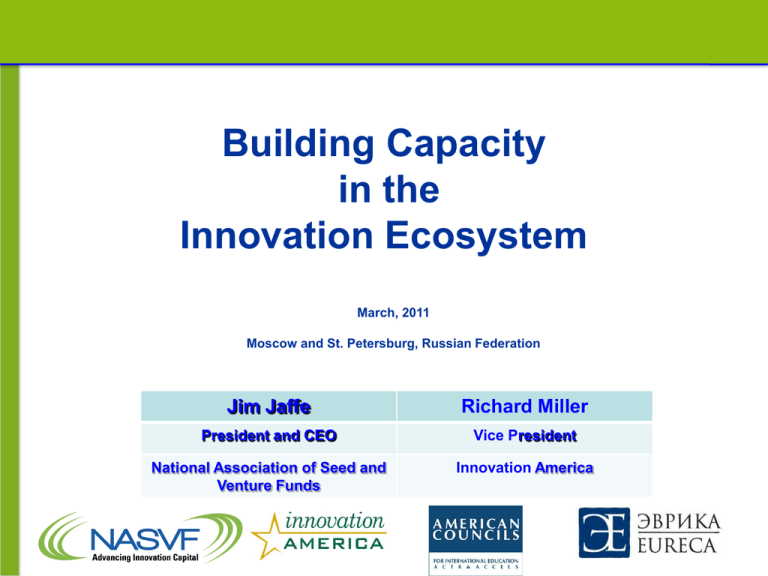
Building Capacity in the Innovation Ecosystem March, 2011 Moscow and St. Petersburg, Russian Federation Jim Jaffe Richard Miller President and CEO Vice President National Association of Seed and Venture Funds Innovation America Innovation Commercialization Requires •Management Knowledge •Research Partnerships •Investment Partners Organization Strengths and Weaknesses - ?? •Research •Scientists •Technology clusters •Venture capital and Angel Groups •Mentoring •Government policy for tech transfer •Marketing and Branding of the technologies in Russia and worldwide •Facilities (incubator and science parks) •Ecosystem Desired Metrics and Recommendations Metrics to Measure Success? •Patents •Licenses •Royalties •Jobs Created •Other Recommendations – 12 to 36 months? The Global Innovation Imperative •Innovation is Key to Growing and Maintaining a Country’s Competitive Position in the Global Economy •Collaboration among Small and Large Businesses, Incubators, Universities, and Research Institutes is Essential for Innovation •New Institutions and New Incentives, are increasingly important to support collaboration and foster innovation Responding to the Innovation Imperative? Leading Nations Provide •High-level Focus •Sustained Support for R&D: Leveraging Public and Private Funds •Support for Innovative SMEs •New Innovation Partnerships to bring new products and services to market Note: Many countries are investing very substantial resources to create, attract and retain industries in leading sectors Global Innovation Networks Global Problems for Business Russian Global Competitive Ranking China’s Global Competitive Ranking Russian – Investment Sectors Innovation Ecosystem Components Public/Private Partnership •Progress is promoted by strong industry, government and university leadership •Sustained by dynamic public/private partnerships •These leaders create new, responsive models of governance The Role of Academia Knowledge Integration Resource Investment Knowledge Creation Education Research Continuous Learning and Innovation Knowledge Transfer Government’s Role in Innovation • Long term vision and planning • Identify gaps and trends in science, technology, innovation and SME development • Be a catalyst through long-term strategic investments and partnering • Develop a balanced and flexible research and development investment portfolio • Encourage private sector innovation • Establish performance-based research and development • Accelerate the commercial exploitation of creativity and knowledge, through innovation and research, to create wealth, grow the economy, build successful businesses and improve quality of life U.S. State IBED Programs Funding & Resources for Innovation Capital Seed TBED Federal Angel Innovative ARS ATIP Innovation Capital Invested before commercial success $100,000 - $2,500,000 Seed Capital $100,000 - $250,000 Early Stage $250,000 - $2,500,000 High risk - vital to new innovative companies Scarce for new entrepreneurs Innovation Capital Providers Angels Tech and innovation-based economic development organizations VC’s Innovation Capital……… Generates 60 to 80% of net new jobs annually Employs 30% of high-tech scientists, engineers, and computer workers Produces 13 to 14 times more patents per employee than large firms Funding Resources Seed TBED Federal Angel Innovative ARS ATIP Bootstrapping The term comes from the German legend of Baron Münchhausen pulling himself out of the sea by pulling on his own bootstraps. Definition: “The act of starting a business with little or no external funding” New Popular Venture Financing Programs Mentorship programs: •Help startups ideate •Form founding teams •Build initial products. Super Angels: Provide capital and guidance to: hire non-founder employees further product development market the initial product (usually to early adopters) and raise follow on VC funding. Seed Investing & Job Creation Category State of PA CDVCA* State of UTAH Funds Invested $90M $26M $60M $291M $800B Jobs Created 8,150 3.700 2,047 28,854 4,000,000 $11,000 $7,100 $29,300 $11,728 $200,000 $ Per Job Invested *Community Development Venture Capital Alliance State of MI Stimulus Bill Innovation Capital Valley of Death Stage Source POR / Pre-Seed Seed/Start-Up Founders, FFF Bootstrapping Crowdfunding $0K $500K Early Angel Groups, IBED, SBIR Accelerators Seed Funds, $2.5M Later Venture Funds M&A, IPO $5.0M Demand “VALLEY OF DEATH” Supply Funding Gap Secondary Funding Gap Innovation Paradigm Shift Innovation Commercialization Model What Is A Road Map…..Why Is It Needed? •A roadmap answers the question “Where do we want to be and how do we get there?” •A cluster roadmap provides strategies and action plans to best achieve a vision of the future shared by a critical mass of industry-related organizations •Strategies and action plans are developed according to the unique strengths of the cluster as compared to a global market opportunity Mapping Characteristics of Innovative Regions • World class research institutions as sources of intellectual capital • Appropriate business assistance programs to accelerate technology commercialization • Seasoned senior managers with entrepreneurial “know-how” that can work in tandem with scientists and engineers on teams to jump-start enterprise creation • Sources of “intelligent” startup capital beyond what “sweat equity/boot-strapping” and “family and friends” capital can provide • Active entrepreneurial networks that can support all the players involved in enterprise creation activities • Institutions of higher learning that can train and quickly upgrade the skills of a world-class workforce for the region’s growing high tech companies All of these regional assets must be integrated for the entire ecosystem to work! Mapping Innovative Regions DNA • Each region’s innovation capacity (“regional DNA”) differs • • • Every region has its unique path to building its cluster Scientific expertise concentrated in a region is distinct from other regions Regions need to understand what they truly have as assets • Must couple world-class scientific with business smarts for successful tech. commercialization • Synergy in a cluster depends on functional social structures between technologists and business community Road Map Elements 1) 2) 3) 4) 5) 6) 7) 8) 9) 10) 11) 12) Asset Mapping Cluster Analysis Benchmarking Resource Identification Organization Analysis and Matrix Gap Analysis Public Policy Strategic Plan Leadership and Staffing Program Implementation Economic Impact Analysis Branding and Market Research 1) Asset Mapping • Provides an inventory of key resources to utilize in a development effort • Provides a deep understanding of the key networks and cultural attitudes that shape a regional economy, indicate gap areas that require further investment • Provides a baseline by which to judge future progress toward regional prosperity. Source: Council on Competitiveness Asset Mapping Roadmap 2) Cluster Analysis A statistical technique that compares multiple characteristics of a population to determine different groups 3) Benchmarking • Compares business processes and performance metrics to industry best practices. Typically measures quality, time, and cost • Requires identifying the best firms in an industry (the "targets") and comparing processes to one's own • Improvements from learning mean doing things better, faster, and cheaper 4) Resource Identification Entrepreneurs' Resource Guides helps businesses to: •Obtain information and outlets to make contacts •Secure funding • Promote their businesses and products to a wide array of consumers •Provide resources that are unique to the geographic regions 5) Organizational Analysis and Matrix - Comprehensive listing of organizations and services 6) Gap Analysis • Helps define resources to bridge current and future gaps that slow down or stop growth • Determines and documents variance between business requirements and current capabilities. • Gap analysis naturally flows from benchmarking 7) Public Policy • Defined as courses of action, regulatory measures, laws, and funding priorities on a given topic promulgated by a governmental entity or its representatives • Commonly embodied in constitutions, legislative acts, and judicial decisions 8) Strategic Plan 9) Leadership and Staffing Be Proactive Begin with the End in Mind Seek First to Understand, then to be Understood Put First Things First Think Win-Win, Be Inclusive Synergize Sharpen the Saw 10) Program Implementation Investment Commercialization World’s Best Technology Network Global & Regional Branding, Research & Workforce / Economic Marketing Development 11) Economic Impact Analysis • Examines the effect of a policy or activity on the economy of a given area - ranging from a neighborhood to the globe • Measured in terms of changes in economic growth (output or value added) jobs (employment) and income (wages) • Calculates the difference from what would be expected if the project or policy did not occur 12) Branding and Market Research ARS Case study - From Research to Jobs USDA Economic Impact Research Project CrispTek/Choice Batter ® Time Line Impact by Location INNOVATION COALITION ECOSYSTEM OUTCOME S Companies Jobs Innovation The Innovation Coalition is a collaborative group of innovation-based associations supporting the key elements of the continuum for commercialization and job creation. The Commercialization “Secret” • • Its not about • TECHNOLOGY! Its about • REVENUE • SCALABILITY • CASH FLOW • PROFITS IN TWO YEARS • COMPETITIVE ADVANTAGE NASVF – OVERVIEW •Established in 1995 •Non profit •Headquarters Philadelphia, PA •175 member organizations •43 states •Five countries •800 members •1/3 Equity funds •1/3 Public TBED •1/3 Technology NASVF Today – Our Role Publications: innovationDAILY& NetNews Get a FREE subscription to Innovation America’s innovationDAILY newsletter www.innovationamerica.us NASVF’s Weekly Innovation Capital newsletter NetNews www.nasvf.org/netnews Summary • Ecosystems advance technology commercialization, innovation, funding and economic growth • Innovation Road Maps provide the strategy to grow technology, commercialization and market the region • Seed and early-stage funding is critical to success • High risk - years to bear fruit • Significant job creation • BIG potential payoff! Potential Next Steps • • • • Establish NASVF Russian chapter Develop pilot seed fund Roadmapping Deliver education programs – Tech transfer – how it works – Investors and entrepreneurs – Commercialization • NASVF 2011 Conference – October in Texas • Meet funders • Tour incubators • Visit TX TT programs Summary • • • • Thank you for your time! How can NASVF help? How can American Councils help? Questions? Organization Strengths and Weaknesses - ?? •Research •Scientists •Technology clusters •Venture capital and Angel Groups •Mentoring •Government policy for tech transfer •Marketing and Branding of the technologies in Russia and worldwide •Facilities (incubator and science parks) •Ecosystem Desired Metrics and Recommendations Metrics to Measure Success? •Patents •Licenses •Royalties •Jobs Created •Other Recommendations – 12 to 36 months?
